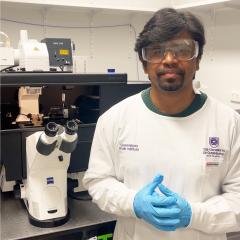A team of researchers has identified a new signaling pathway that can protect the neurons that degenerate in Parkinson’s disease (PD).
Dr Richard Gordon from The University of Queensland’s School of Biomedical Sciences (SBMS) said he discovered the protein Prokineticin-2 (PK2) was highly expressed while studying mechanisms by which neurons degenerate in PD.
Dr Gordon, the lead author on the study published in Nature Communications, worked on the project at UQ and at Iowa State University in the United States.
“After this serendipitous discovery, the team identified that PK2 is secreted by these neurons at the early stages of cell death,” Dr Gordon said.
“It acts as a compensatory survival mechanism and can protect neurons from degeneration by stimulating mitochondrial biogenesis, delaying progression of the disease.
“The findings could lead to the development of new therapeutic strategies for Parkinson’s disease in the future.”
Dr Gordon said that pre-clinical testing has shown that if the protein is upregulated or delivered in significant amounts in the brain, it can protect neurons in a PD model.
“The next step is to look at the protein in other models of Parkinson’s and if those studies are conclusive then we could move towards clinical translation of these findings.
“If we could intervene early enough this strategy could potentially delay progression of the disease, but there is still work to be done to understand the mechanisms involved in order to develop an optimal therapeutic strategy that would be effective in the clinic. ”
Media: Dr Richard Gordon, r.gordon1@uq.edu.au, +61 7 33652384; Kim Lyell, k.lyell@uq.edu.au, +61 7 33465214, 0427 530647.



